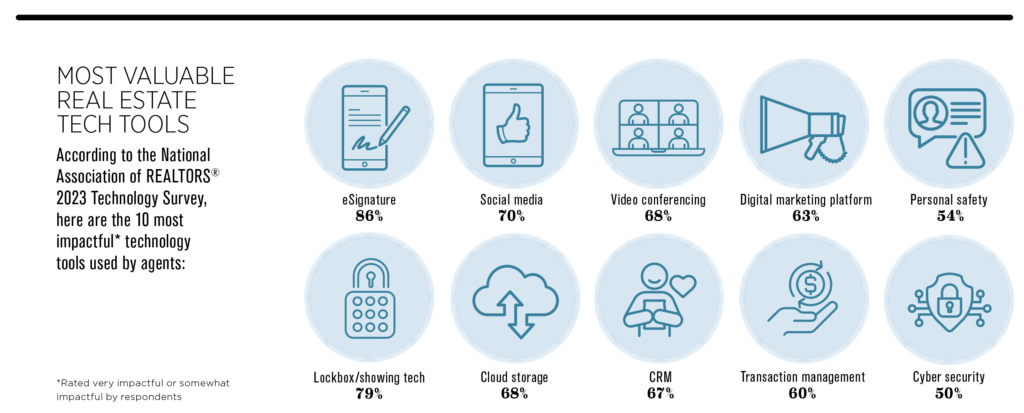Team leaders must put careful thought and planning into introducing new technology
By Scott Mason
Every day, consumers read or hear about a brand-new piece of technology being brought to market. Whether software or hardware, today’s digital age breeds innovation and pressure to adopt new tools.
This technology overload can weigh heavily on business owners and team leaders, who must ensure efficient and cost-effective operations. How do residential real estate agents decide if a new technological tool suits their team? And if it does, how should they implement it?
That decision-making process must include detailed research followed by a smooth rollout. To help agents, Joseph Newman, CRS, broker/co-owner of the Sultan Newman Group with Compass – Denver in Denver, Colorado, shares his experiences introducing new technology and provides guidance for those taking the plunge.
Balancing value
According to Newman, frequent adoption of new technology may not be the best policy. “We try not to introduce new technology too often. Ideally, we wouldn’t introduce new technology even annually,” he says.
Part of his hesitation stems from the lack of substantial difference from platform to platform. The “shiny new thing” on the market is often not that. Many products can do almost the exact same thing and will claim to be life-changing for a brokerage. “In reality, they’re barely shiny; they simply have a different name,” he says.
However, that’s not to say new tech isn’t valuable. Newman says that one of the reasons he decided to move his team to a brokerage like Compass that operates mostly online was to stay ahead of the industry curve. “Compass already has a tech-heavy system in place,” he says. “With that, updates and tweaks are rolled out as frequently as monthly.”
Establishing a system
 When Newman introduces new technology to his team, he ensures he enters the process with a detailed action plan. “If we’re introducing some sort of new marketing platform, I do a case study to see whether or not it actually has teeth in the real world,” he says. He will go to the segment of his team most impacted by the change and beta test, asking the participants whether the new technology works for their needs.
When Newman introduces new technology to his team, he ensures he enters the process with a detailed action plan. “If we’re introducing some sort of new marketing platform, I do a case study to see whether or not it actually has teeth in the real world,” he says. He will go to the segment of his team most impacted by the change and beta test, asking the participants whether the new technology works for their needs.
He also notes that company representatives or salespeople for certain products will offer to run through a system’s applications with him and his team. But agents should take that with a grain of salt, as at the end of the day, they’re simply trying to make a sale, and they don’t know the actual day-to-day needs of the real estate operation.
Managing team expectations
Once you find a new piece of technology that works for your needs, the acceptance and adoption from team members are paramount. Newman says that if a team member pushes back, more training and explanation of the potential benefits may be necessary.
Going a step further, he may employ feedback from other teams within the brokerage to help convince wary agents. “We have many people within our brokerage, and I have good standing with many other teams,” Newman says. “If the other teams are liking it, we’ll ask them to share their pros and cons, then bring those who aren’t fully bought into the group and say, ‘Hey, this broker likes it for this reason.’” A person may not want to hear it from him directly but rather from someone with a similar role within the organization.
Newman says he’s never faced such resistance from a team member to the point of reprimand, but he has seen agents not fully adopt the features they don’t like. In these cases, he says most platforms are customizable and allow for tinkering to determine the best way to incorporate the entire team.
Client rollout
At the end of the day, Newman says that any new technology must benefit the clients his team serves. “I have a fully benevolent agenda,” he says. “If it doesn’t make the clients’ lives easier, I’m not even going to introduce it.”
This means that sometimes Newman will give a client different technology options for working with his team or tweaking a system or platform to make things go smoothly. “We’re in that business where every client is somewhat of a boss. I want to make sure that they’re comfortable no matter what,” he says.
Newman gravitates toward technologies that are more of a one-stop shop and have dashboards that both the client and agent can see. “Something that is often missed is connecting the process of what we’re doing as agents with what the client is actually receiving and seeing,” he says. “The more transparency that we can get within a single platform, the better off everybody’s going to be in the end.”

Let RRC’s Cryptocurrency, Blockchain DeFi & NFTs Certification solidify your proficiency in emerging FinTech. Visit www.CRS.com/education/certifications-and-certificates for more information.
Photo: skynesher E+ via Getty Images








